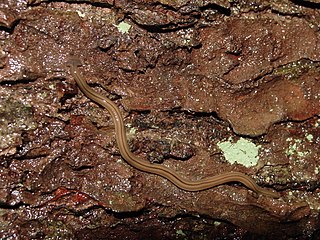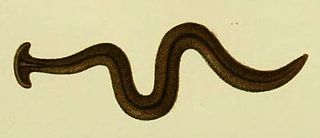
Planarians (triclads) are free-living flatworms of the class Turbellaria., order Tricladida, which includes hundreds of species, found in freshwater, marine, and terrestrial habitats. Planarians are characterized by a three-branched intestine, including a single anterior and two posterior branches. Their body is populated by adult stem cells called neoblasts, which planarians use for regenerating missing body parts. Many species are able to regenerate any missing organ, which has made planarians a popular model in research of regeneration and stem cell biology. The genome sequences of several species are available, as are tools for molecular biology analysis.

Dugesia is a genus of dugesiid triclads that contains some common representatives of the class Turbellaria. These common flatworms are found in freshwater habitats of Africa, Eurasia, and Australia. Dugesia is best known to non-specialists because of its regeneration capacities.

Planariidae is a family of freshwater planarians.
The Lake Pedder planarian is a species of invertebrate in the family Dugesiidae.
Romankenkius is a genus of freshwater planarian in the family Dugesiidae.

Continenticola is a clade that includes the land planarians (Geoplanidae) and the freshwater triclads.

Dugesiidae is a family of freshwater planarians distributed worldwide. The type genus is Dugesia Girard, 1850.

Girardia is a genus of freshwater planarians belonging to the family Dugesiidae.

Dendrocoelidae is a family of freshwater tricladida flatworms that has a holarctic distribution.
Dugesia notogaea is a species of dugesiid triclad that inhabits freshwater bodies of north Queensland, Australia.

Maricola is a suborder of triclad flatworms including species that mainly inhabit salt water environments. However, some species are also known from freshwater or brackish waters.
Dugesia sicula is a species of dugesiid triclad that lives in freshwater bodies of the Mediterranean Basin, where it is widely distributed. It has been reported from Sicily, Elba and Mallorca, Eivissa, Sardinia, Algeria, Tunisia, Morocco and Crete.

Geoplanoidea is a superfamily of freshwater and land triclads that comprises the species of the Geoplanidae and the Dugesiidae families.

Kenkiidae is a family of freshwater triclads. Their species can be found sporadically in caves, groundwater, and deep lakes in Central Asia, Far East and North America.

Bdellouridae is a family of Maricola triclads.

Microplana is a genus of land planarians found in Europe and Africa.
Neppia is a genus of dugesiid triclad that is found in South America, Subantarctic region, Africa, Tasmania and New Zealand.

Geoplaninae is a subfamily of land planarians endemic to the Neotropical region. Members of this family are sometimes referred to as the Neotropical land planarians. However, one species, Obama nungara has been introduced in Europe.

Bipaliinae is a subfamily of land planarians found mainly in Madagascar, the Indian subcontinent and Southeast Asia, although some species have been introduced worldwide.

Humbertium is a genus of land planarians of the subfamily Bipaliinae.













